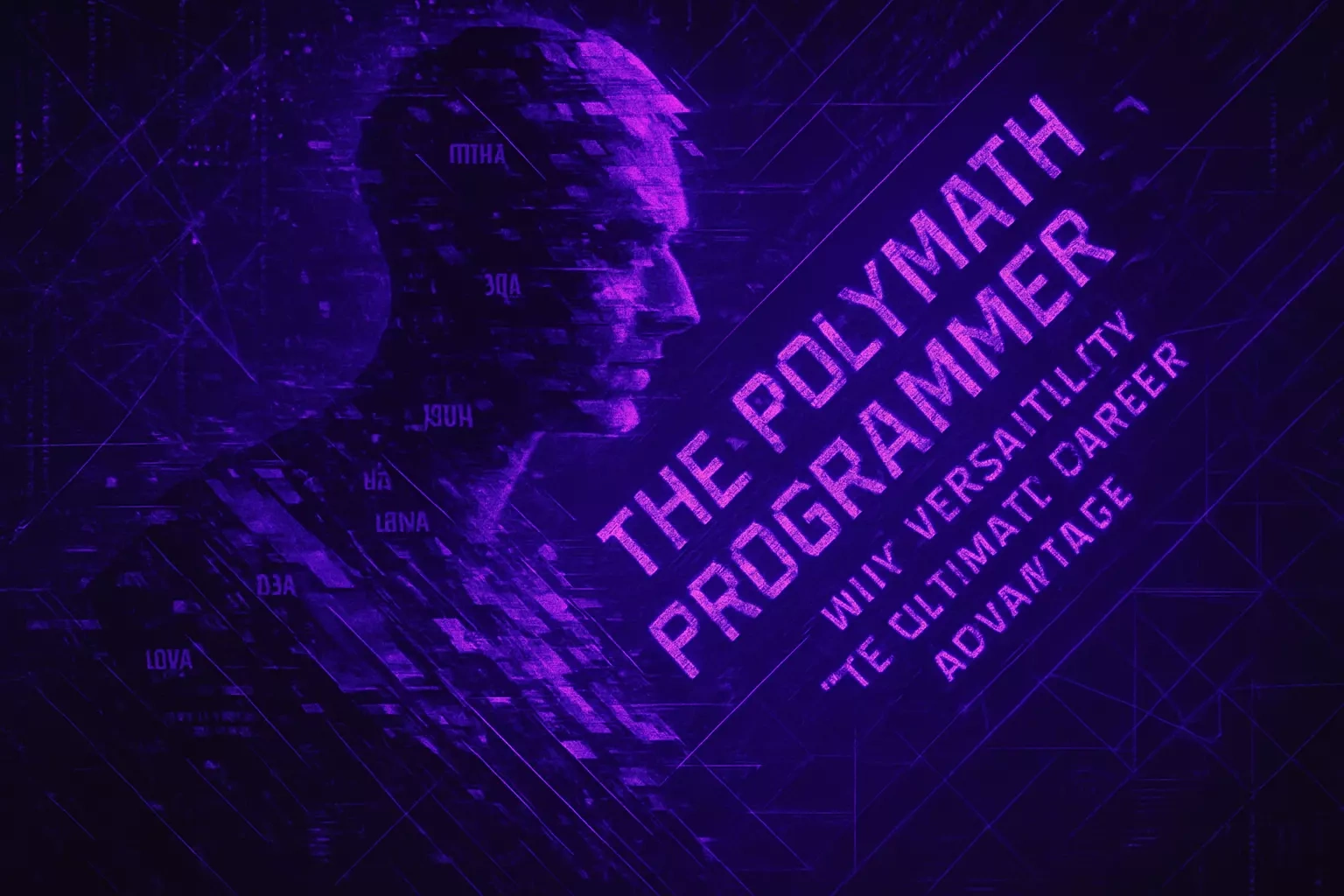The Polymath Programmer: Why Versatility Is the Ultimate Career Advantage

The Polymath Programmer: Why Versatility Is the Ultimate Career Advantage
Beyond the 'I-Shaped' Developer: The Rise of the Polymath
Defining the T-Shaped Skill Set
Why the Future is Cross-Functional
The Tangible Benefits of Versatility
Increased Career Opportunities
Enhanced Problem-Solving Abilities
Future-Proofing Your Career
How to Cultivate Your Inner Polymath
Embrace Lifelong Learning
Step Outside Your Comfort Zone
Focus on Fundamentals
The Polymath in the Freelance World
Becoming a One-Person Powerhouse
Commanding Higher Rates
Conclusion
References
The Polymath Programmer: Why Versatility Is the Ultimate Career Advantage
In a tech world that changes at lightning speed, the debate between specialization and generalization is more relevant than ever. While deep expertise in one area is valuable, the ultimate career advantage may belong to the 'polymath programmer'—a versatile developer with a broad range of skills. This adaptability is a superpower in the world of freelance coding jobs.
The modern developer landscape demands more than just coding prowess. Today's programmers must master new forms of communication like prompt engineering and even be able to reimagine everyday life through apps. This shift toward versatility isn't just a trend—it's becoming essential for career survival and growth.
Beyond the 'I-Shaped' Developer: The Rise of the Polymath
The traditional path for developers has long been clear: pick a language, master it deeply, and become the go-to expert. This "I-shaped" approach—deep knowledge in one narrow area—worked well when tech teams were large and roles were clearly defined. But times have changed.
Today's tech landscape rewards those who can adapt, learn quickly, and contribute across multiple domains. Enter the polymath programmer: a developer who combines depth with breadth, creating opportunities that specialists might miss.
Defining the T-Shaped Skill Set
Think of the T-shaped developer as having two dimensions of knowledge. The vertical bar represents deep expertise in one core area—maybe you're a JavaScript wizard or a Python guru. That's your foundation, your home base.
The horizontal bar? That's where things get interesting. It represents your broad knowledge across related disciplines. You understand UI/UX principles well enough to have meaningful conversations with designers. You grasp database management concepts that help you optimize queries. You know enough about cloud infrastructure to deploy your own applications. You even understand business strategy well enough to align your technical decisions with company goals.
This isn't about being mediocre at everything. It's about being excellent at one thing while being competent enough in others to see the big picture. A T-shaped developer can speak multiple "languages"—not just programming languages, but the languages of design, business, and user experience.
Why the Future is Cross-Functional
Look at any modern tech company, and you'll notice something: teams are getting smaller and more agile. The days of massive departments with rigid hierarchies are fading. Instead, we're seeing cross-functional teams where five people might handle what twenty used to do.
In this environment, the developer who only knows backend code becomes a bottleneck. When the designer is out sick, who can tweak the UI? When the DevOps engineer is swamped, who can help with deployment issues? The polymath programmer steps up.
Companies are catching on to this reality. They're looking for developers who can contribute to different parts of the product lifecycle. They want people who can prototype quickly, understand user needs, write clean code, and even contribute to product strategy. The siloed specialist, no matter how brilliant, simply can't compete with someone who brings this level of versatility to the table.
The Tangible Benefits of Versatility
Let's move from theory to practice. What does being a polymath programmer actually get you? The benefits are both immediate and long-lasting, affecting everything from your job prospects to your daily problem-solving abilities.
Increased Career Opportunities
Here's a simple math problem: if you only know backend development, you can apply for backend roles. But if you're a full-stack developer with additional skills in mobile development and data analysis? Your opportunity pool just multiplied.
A polymath programmer might start their job search looking for full-stack positions but find themselves qualified for roles they hadn't even considered. That React Native experience? It qualifies you for mobile developer positions. Your side project with machine learning? Suddenly you're a candidate for data engineering roles. Your experience with AWS? DevOps teams want to talk to you.
This isn't just about having more options—it's about having better options. Companies value versatile developers so highly that they often create custom roles to accommodate their unique skill sets. You might find yourself in a position that perfectly matches your interests because you bring a combination of skills that's hard to find.
Enhanced Problem-Solving Abilities
When you only have a hammer, everything looks like a nail. But when you have a full toolbox? You start seeing solutions that others miss.
A backend developer might approach a performance issue by optimizing database queries. A frontend developer might tackle it by implementing lazy loading. But a polymath programmer? They see both options and can choose the most effective solution—or better yet, implement a combination that addresses the root cause from multiple angles.
This cross-pollination of ideas is where innovation happens. Maybe you apply a design pattern from mobile development to solve a web problem. Perhaps your understanding of data structures from competitive programming helps you optimize a React component. These connections aren't possible when your knowledge is confined to a single domain.
Real-world example: I once worked with a developer who combined their knowledge of game development with web applications. They used game engine concepts to create incredibly smooth animations in a web app, achieving performance that traditional web developers struggled to match. That's the power of diverse knowledge.
Future-Proofing Your Career
Technology moves fast. Really fast. The hot framework from five years ago might be legacy code today. The programming language everyone was learning last year? It might be losing steam already.
For specialists, this rapid change is terrifying. If you've spent ten years becoming the world's expert in a technology that's becoming obsolete, what do you do? Start over?
Polymath programmers don't have this problem. They've already proven they can learn new technologies and adapt to different paradigms. When one skill becomes less relevant, they lean on others while updating their knowledge. They're not starting from zero—they're building on a foundation of diverse experience.
More importantly, versatile developers develop meta-skills that transcend specific technologies. They learn how to learn. They understand patterns that appear across different languages and frameworks. They can pick up new tools quickly because they've seen similar concepts before, just in different forms.
How to Cultivate Your Inner Polymath
Becoming a polymath programmer isn't about trying to learn everything at once. It's about strategic expansion of your skills and maintaining a mindset of curiosity and growth. Here's how to start your journey.
Embrace Lifelong Learning
The most important shift is mental. Stop thinking of learning as something that ended when you got your first job or finished your bootcamp. In tech, graduation is just the beginning.
Set aside dedicated time for learning—even just 30 minutes a day makes a huge difference. But here's the key: don't just deepen your existing skills. Deliberately explore adjacent areas.
If you're a frontend developer, spend a month learning about databases. If you're a backend engineer, dive into CSS animations. Mobile developer? Explore cloud architecture. The goal isn't mastery—it's exposure and understanding.
Create a learning rotation. Maybe you spend one quarter deepening your core skills, the next exploring a completely new area, then the third working on a project that combines both. This approach keeps you engaged while systematically broadening your expertise.
Step Outside Your Comfort Zone
Theory is important, but nothing beats hands-on experience. The fastest way to develop polymath skills is to actively seek opportunities that stretch your abilities.
Start with open-source contributions. Find a project that uses a technology stack you're unfamiliar with. Your first contributions might be small—fixing typos in documentation or addressing simple bugs. But you're learning the codebase, the tools, and the patterns. Before long, you're making meaningful contributions and adding new skills to your repertoire.
Side projects are another goldmine. Build something that forces you to wear multiple hats. Create a mobile app if you're a web developer. Build a web dashboard if you're a mobile developer. The project doesn't need to be perfect or even public—it's a learning laboratory.
At work, volunteer for cross-functional initiatives. Pair with the designer on a UI overhaul. Sit with the DevOps team during a deployment. Shadow the data analyst for a day. Most colleagues are happy to share their knowledge, and you'll gain insights that make you a better developer overall.
Focus on Fundamentals
Here's a secret: while technologies change constantly, the fundamentals remain remarkably stable. Data structures, algorithms, design patterns, system architecture—these concepts appear everywhere, just wearing different costumes.
When you understand the fundamentals deeply, learning new technologies becomes pattern matching. That new JavaScript framework? It's using the same MVC pattern you learned in Ruby on Rails. The hot new database? It's still about understanding indexes and query optimization.
Invest time in studying computer science concepts, even if you're self-taught. Read about different programming paradigms. Understand how networks actually work. Learn about compiler design, even if you'll never build one. This foundational knowledge makes everything else click into place faster.
Don't chase every new tool or framework. Instead, when you do learn something new, dig deeper to understand the problems it's solving and the patterns it's using. This approach builds lasting knowledge rather than surface-level familiarity.
The Polymath in the Freelance World
If versatility is valuable for full-time developers, it's absolutely essential for freelancers. The freelance world rewards those who can deliver complete solutions, adapt quickly, and provide value across multiple domains.
Becoming a One-Person Powerhouse
When you work for a large company, you can afford to specialize. There's always someone else to handle the parts you don't know. But freelancers? We're often the entire tech team.
Your client needs a web application. Great, you can build that. But they also need it deployed somewhere. They want analytics integrated. They need basic SEO optimization. Oh, and can you make sure it looks good on mobile?
The specialist freelancer has two options: turn down the work or scramble to find subcontractors. The polymath freelancer? They smile and get to work, knowing they can handle every aspect of the project.
This completeness is incredibly valuable to clients, especially smaller businesses or startups. They don't want to manage five different freelancers for one project. They want someone who can take their idea and turn it into reality—the whole reality, not just one piece of it.
Being a one-person powerhouse doesn't mean you do everything yourself all the time. It means you can when needed, and you understand enough about each area to make smart decisions about when to bring in additional help.
Commanding Higher Rates
Here's where versatility directly impacts your bank account. Polymath freelancers command higher rates for several reasons.
First, you're solving bigger problems. Instead of just coding a feature, you're delivering a complete solution. You're not just a developer—you're a technical consultant who happens to also implement the solutions you recommend.
Second, you save clients time and money. They don't need to hire multiple specialists or spend time coordinating between different freelancers. The efficiency you provide justifies premium pricing.
Third, you can choose more interesting projects. When you're versatile, you're not competing for the same narrow slice of work as every other specialist. You can target projects that sit at the intersection of multiple disciplines—often the most innovative and well-funded ones.
I've seen polymath freelancers charge 50-100% more than specialists because they deliver that much more value. A client paying $150/hour for someone who can handle frontend, backend, deployment, and basic design is getting a better deal than paying $75/hour each to two specialists who need constant coordination.
Conclusion
The age of the polymath programmer is here. While deep expertise remains valuable, the developers who thrive in today's landscape combine depth with breadth, creating unique value propositions that pure specialists can't match.
Becoming a polymath isn't about spreading yourself thin or becoming a "jack of all trades, master of none." It's about strategic skill development that amplifies your core expertise while opening new opportunities. It's about seeing connections others miss and solving problems others can't even conceptualize.
Whether you're a freelancer looking to command higher rates or a full-time developer aiming to future-proof your career, versatility is your secret weapon. Start small—pick one adjacent skill and spend the next month exploring it. Build a side project that stretches your abilities. Volunteer for that cross-functional team at work.
The path to becoming a polymath programmer is a journey, not a destination. But with each new skill you add, each connection you make between different domains, you become more valuable, more adaptable, and more capable of shaping the future of technology.
The question isn't whether to specialize or generalize—it's how to do both strategically. In a world that rewards those who can adapt, learn, and contribute across boundaries, the polymath programmer doesn't just survive. They thrive.
References
Like this project
Posted Jun 17, 2025
Specialization is valuable, but versatility is power. Learn why the 'polymath programmer'—a coder with T-shaped skills—is thriving in today's dynamic freelance job market.









